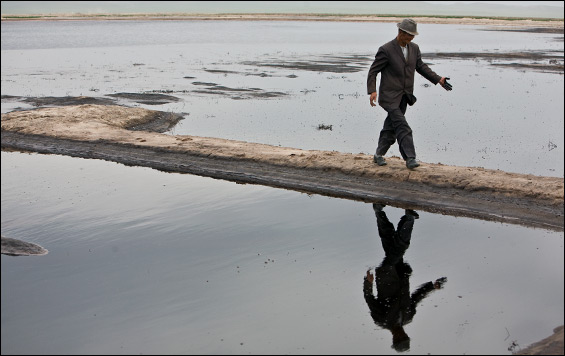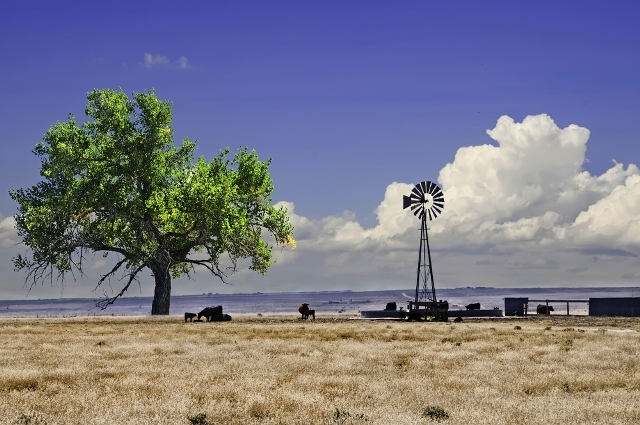Blackwater: Rare Court Victory in Pollution Case
Dianhua Paper Mill discharged 2.5 million tons of untreated industrial wastewater every year into a lagoon that ruptured near an Inner Mongolian village, killing sheep, sickening people, and damaging grasslands. A group of herders brought suit and won a small settlement. The contamination persists. Photography by Palani Mohan, Getty Images, for Circle of Blue

By W. Chad Futrell
Special to Circle of Blue
Before the Dianhua Paper Mill moved from Hebei Province, just outside of Beijing, to Jirigalanggazha Village in Inner Mongolia, it had already earned a reputation with its neighbors and government authorities as a terrible water polluter. The mill was closed in 1999 because, rather than pay for an expensive water filtering and treatment system, the owner decided to relocate the factory to an area that welcomed polluting industries.
Inner Mongolia was a natural choice. The central government had launched an ambitious Western Development campaign, which since 1998 aimed to promote economic growth in China’s poorer western and northern regions, but often without regard to the environmental consequences. The policy and investment led to industrialization that accelerated the ruin of fragile water and grassland ecosystems.
It also harmed people, among them Damulinzabu, an Inner Mongolian herder, who was living a quiet life of purpose near Jirigalanggazha Village when the mill set up shop in 2000. By the time Dianhua Paper Mill left almost six years later, his land had been ruined and Damulinzabu had assumed new roles as an activist, legal plaintiff, and court room pioneer in the mismatch that exists in China between polluting industries seeking profits and citizens determined to protect their land and families.
One Day, A Polluter Comes to Town
The Dianhua Mill arrived with little notice in Dongwu County, Xilingele Prefecture, on the relatively water-rich Wuzhumuqin Grasslands. The county government was looking for a company to occupy a building previously occupied by a bankrupt horse meat processing company. Other inducements included conveying land to the Dianhua Mill that had originally belonged to 18 Mongol herders, returning any income taxes to the mill for the first seven years of its operation, and agreeing to levy annual charges of just 50,000 Yuan ($6,400) for water and another 20,000 Yuan ($2,600) for wastewater discharge.
As is often the case in China, the paper mill started production in March 2000 without undergoing any kind of formal environmental evaluation. The mill excavated 640 acres — one square mile — to serve as a wastewater lagoon. It discharged 2.5 million tons of untreated wastewater into the lagoon every year, and did so without any regard to whether it seeped into the aquifer below.
It was not long before the discharges raised official concern. The Dongwu County Water Conservancy Bureau and Environmental Protection Bureau investigated and estimated that the mill was using between 2 million and 3 million tons of groundwater a year, thus draining local aquifers and harming the nearby grasslands. The Environmental Protection Bureau also found the wastewater discharge was loaded with toxic pollutants.
Herders Protest
Damulinzabu was among the local herders who complained to authorities of headaches, dizziness, and nausea from the noxious odors. The herders said that the grass around the lagoon was dead, a sign that the wastewater was seeping into the groundwater. Damulinzabu and his neighbors filed the first of a number of petitions to local village Communist Party members and cadres. They wanted the land used by the mill to be returned to herders, and that measures be enacted to protect the water supply and grasslands.
Lastly, they wanted to be compensated for damage to their herds they believed was caused by pollution. “I would not let my sheep go anywhere near that pond,” said Damulinzabu. “They were losing weight, and they stopped lambing. All of the herders around here had the same problems. Some of the sheep even stopped producing wool.”
Not surprisingly, the herders were viewed as upstarts and the early petitions were rejected. But the herders did not give up and carried their appeal to higher levels of government, even to the top government office in the Inner Mongolia Autonomous Region. Doing so carried considerable risk and challenged Damulinzabu’s self-effacing spirit.
He said in an interview that he was reluctant to file the petition and continue with the arduous appeal process. “I did not want to cause any trouble,” he said. “I have been a cadre member for a long time. But that smell! I was dizzy and my wife was vomiting all the time.”
Then came calamity. In December 2001, eighteen months after the legal process began, a dike holding the wastewater ruptured, contaminating 700 acres of land and killing 2,000 livestock belonging to 18 herders.
Lawsuit Filed
Damulinzabu lost fifty sheep. The next day the herders filed another petition and made it known that they would pursue a lawsuit if nothing was done about the Dianhua Mill. Officials from the county government spent the next month visiting the homes of the herders, trying to convince them to give up their petition and telling them that the mill was too important to the local economy to shut down.
After 18 months of fruitless appeals, Damulinzabu and six other herders brought suit against the Dianhua Paper Mill with the help of a Beijing-based law firm. The lawsuit, filed in August 2002, sought 3.15 million Yuan (approximately $400,000) in compensation. The Intermediate People’s Court of Xilingele Prefecture accepted the case, requesting the Dongwu County government to appear in court as a third party.
The county government responded by again visiting the homes of the seven herders to try to pressure them to drop the case. The county also issued five copies of the State-owned Land-use Right Certificate, officially transferring the herders’ land to state-owned assets, and then leased the land to the Dianhua Paper Mill. In other words, the county took their land and, in effect, tried to eliminate their legal standing in the case.
“We could not believe the county government would do such a thing,” said Damulinzabu. “Our ancestors have been living on these grasslands for generations, but it was like we were squatters on our own land.”
The pressure prompted four of the seven herders to drop out of the lawsuit. But Damulinzabu and two others did not back down. In March 2004, the Intermediate Court ruled in favor of the herders, ordering the Dianhua Mill to pay the herders over 170,000 Yuan ($22,000) for damages. The court also ordered the Dongwu County government to compensate the herders with over 50,000 Yuan ($6,400) as well as legal fees.
Unsatisfied, the three herders appealed to the Supreme People’s Court of the Inner Mongolia Autonomous Region, asking for more compensation as well as the return of 1,760 acres of the collectively owned land occupied by the mill.
Victory, With Consequences
In 2004, the Supreme People’s Court ruled in favor of the herders, ordering the Dianhua Paper Mill and Dongwu County government to pay the herders 360,000 Yuan ($45,000) as compensation for the damage caused to the herders and their livestock. However, the Supreme People’s Court dismissed their petition to return the occupied land, nor were they fully compensated for the damaged grasslands.
The Dianhua Paper Mill operated as usual for another year until public pressure forced it to close in October 2005. Months later it reopened in another part of Inner Mongolia, where the plant owner received similar tax incentives and subsidized water.
“I want my sons and other herders to know that they can stand up to people destroying the grasslands,” reflected Damulinzabu, looking out over the inky black pond that abuts his lands.
The noxious odors still give him and his wife headaches and nausea. “Who is going to clean this up? Who?” he asks. For Damulinzabu, there is no victory, no solace. The court settlement was enough to buy some land outside of the village where he and his family plan to rebuild their herd. “The money is not enough for us to have the same life we had before the mill came, but it is the best we can do,” he said.
The legal victory also made him famous among the Mongol herders of eastern Inner Mongolia. “China is becoming a nation of laws, but these laws only matter when we use them,” he said. “I hope my sons and other herders will learn from my example to stand up for their rights. Herders have to learn Chinese. We have to read and understand the laws because that is the only way we can protect the grasslands.”
But the irrefutable fact is that he will soon follow the mill, which left Jirigalanggazha Village. “We can’t drink the water, and our sheep still can’t put on weight, so how could we stay? These grasslands were some of the best in the region. We have a lot of water, which is why that paper mill wanted to come here. Now the water is ruined.”
W. Chad Futrell is a Ph.D. candidate in development sociology at Cornell University. He recently completed two years of fieldwork on transnational environmental cooperation to prevent desertification and protect wetlands in Northeast Asia, funded by Fulbright-Hays and Korea Foundation fieldwork fellowships. Reach him at wchadfutrell@gmail.com.
Research and editing assistance for this article was provided by Jennifer L. Turner, the director of the China Environment Forum at the Woodrow Wilson Center in Washington, DC. Reach her at cef@wilsoncenter.org.







Leave a Reply
Want to join the discussion?Feel free to contribute!